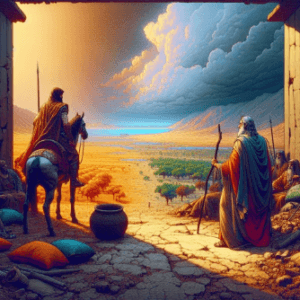GOD REAFFIRMS HIS COVENANT TO ISAAC
This chapter is about Isaac. In fact, it is the only chapter that is really about Isaac, and it just isn’t very thrilling. All he does is dig wells. God has a message for us in this also.
In fact, it is a very important message, and Paul stated it quite accurately: “For whatsoever things were written aforetime were written for our learning, that we through patience and comfort of the scriptures might have hope” (Rom. 15:4).
This is a chapter that teaches patience, and some of us need that—certainly I am in that category. Yet, we would not have you get the impression that patience is all that God wants of us.
The Lord also had men like Abraham, like Jacob, and like David, men who were real go-getters and who were aggressive. God can use that also. But the life of Isaac has a great message for many of us.
“All scripture is given by inspiration of God, and is profitable for doctrine, for reproof, for correction, for instruction in righteousness: That the man of God may be perfect, throughly furnished unto all good works” (2 Tim. 3:16–17).
With that in mind, let us come to this chapter. Isaac, the beloved son, has the covenant confirmed to him. Then we find him dropping into the same sin of unbelief as his father Abraham had done.
Finally, we see him digging wells in the land of Gerar. This doesn’t seem to be very exciting but there is a message here for us; so let us not miss it. So let’s remember, Genesis 26 focuses on the Lord reassuring Isaac.
God states that His relationship with Abraham, and its blessings, are for Isaac, as well. God appears to Isaac not once, but twice in this chapter.
In both cases, the Lord restates and emphasizes the covenant promises He had made to Abraham, and is now making to Isaac.
For the majority of this passage, no mention is made of Jacob and Esau, and Rebekah’s marital status is obscured. It’s likely that most of this chapter is set back before Jacob and Esau are born.
Isaac and Rebekah were childless for 20 years, leaving plenty of time for these events to occur (Genesis 25:20–26).
A season of famine falls on the land. It is a different famine than the one that drove Abraham to move to Egypt in Genesis 12.
In fact, the Lord appears to Isaac and commands him not to move to Egypt, but to settle instead in Gerar, the region of the Philistines ruled by King Abimelech (Genesis 26:1–5).
Scholars disagree on whether this is the same Abimelech Abraham knew in Genesis 20—21 or a new one.
Interestingly, both the king and the commander of the army have the same names as in the incident with Abraham (Genesis 21:22). This might prove they are, in fact, the very same men.
Or, it might simply mean the fathers had passed down both their names and positions to their sons. Given how long it has been since Abraham’s encounter, it seems most likely this is a new ruler.
Isaac had been trained up in a believing dependence upon the Divine grant of the land of Canaan to him and his heirs; and now that there is a famine in the land, Isaac still cleaves to the covenant.
The real worth of God’s promises cannot be lessened to a believer by any cross providences that may befall him.
If God engage to be with us, and we are where he would have us to be, nothing but our own unbelief and distrust can prevent our comfort.
The obedience of Abraham to the Divine command, was evidence of that faith, whereby, as a sinner, he was justified before God, and the effect of that love whereby true faith works.
God testifies that he approved this obedience, to encourage others, especially Isaac.
Genesis 26:1-5 KJV
[1] And there was a famine in the land, beside the first famine that was in the days of Abraham. And Isaac went unto Abimelech king of the Philistines unto Gerar.
[2] And the LORD appeared unto him, and said, Go not down into Egypt; dwell in the land which I shall tell thee of:
[3] Sojourn in this land, and I will be with thee, and will bless thee; for unto thee, and unto thy seed, I will give all these countries, and I will perform the oath which I sware unto Abraham thy father;
[4] And I will make thy seed to multiply as the stars of heaven, and will give unto thy seed all these countries; and in thy seed shall all the nations of the earth be blessed;
[5] Because that Abraham obeyed my voice, and kept my charge, my commandments, my statutes, and my laws.
Genesis 26:1 KJV
And there was a famine in the land, beside the first famine that was in the days of Abraham. And Isaac went unto Abimelech king of the Philistines unto Gerar.
 This is now the second famine that is mentioned. You remember the famine in the days of Abraham when Abraham and Lot took off for Egypt.
This is now the second famine that is mentioned. You remember the famine in the days of Abraham when Abraham and Lot took off for Egypt.
Isaac’s experiences in Genesis 26 parallel those of Abraham, as described both in Genesis 12 and particularly in Genesis 20—21. In both instances, lies are told about a marriage out of selfishness and fear.
Some scholars suggest this is a different version of the same events between Abraham and Abimelech, as told in chapter 20.
Others, however, insist the two stories are separate and meant to show that God would be faithful to Isaac just as He had been faithful to Abraham.
In any case, this verse makes clear that this famine is not the same one that drove Abraham and Sarah to Egypt in Genesis 12. This is a separate time of hardship.
In the following verse, the Lord will tell Isaac explicitly not to go to Egypt in search of food. Instead, Isaac made his way to Gerar, a land ruled by Abimelech, king of the Philistines, to find more fertile territory.
Though not all scholars agree, most believe this Abimelech is not likely to be the same one Abraham interacted with. Approximately 90 years have passed since that event.
It’s possible “Abimelech” may have been a title—like “Pharaoh” or “Caesar”—rather than a personal name.
The same might be true of the name of the army commander (Genesis 21:22; 26:26), or these might be names passed from fathers to sons. This Abimelech is said to be king of a people called “Philistines.”
These Philistines, apparently, are not the same group that will later plague Israel. The title seems to be regional, not ethnic, and implies the people living in a certain area.
Genesis 26:2 KJV
And the LORD appeared unto him, and said, Go not down into Egypt; dwell in the land which I shall tell thee of:
 Why did God say that to Isaac?
Why did God say that to Isaac?
Well, he had an example before him of his father who had run off down to the land of Egypt. This reveals the fact that “like father, like son,” sins are carried from father to son.
You can talk about the generation gap all you want, but there is no generation gap of sin. It just flows right from one generation to the other.
Generally, the son makes very much the same mistakes that the father did, unless something intervenes. So God gives definite instructions to Isaac at the time of famine.
And He confirms the covenant which He had made with Abraham. Famines were not uncommon in the land of Canaan, and they often forced migrations as people moved around to find more fertile territory and food.
These might have been caused by periods of pests, drought, or other environmental problems. Genesis 12 describes the famine that forced Abraham and Sarah to travel with their company down to Egypt in search of relief.
This is another, separate famine. Isaac and his family have moved to Gerar, where Abimelech rules as king of the Philistines. Now the Lord appears to Isaac and commands him not to go to Egypt.
Perhaps relations between the Egyptians and the family of Abraham have not yet healed—Abraham was evicted from the country many decades prior for lying about his wife (Genesis 12:18–20).
As the following verses will make clear, the Lord wants to show Isaac that He will provide the same blessing and protection to him that He gave to Abraham.
His instructions to Isaac echo those given to Abraham, many decades earlier (Genesis 12:1).
Genesis 26:3 KJV
Sojourn in this land, and I will be with thee, and will bless thee; for unto thee, and unto thy seed, I will give all these countries, and I will perform the oath which I sware unto Abraham thy father;
 God says to Isaac, “Don’t leave this land, don’t go down to Egypt. I want to confirm with you the covenant which I made with Abraham.” A famine has forced Isaac and his family to migrate in search of more fertile territory.
God says to Isaac, “Don’t leave this land, don’t go down to Egypt. I want to confirm with you the covenant which I made with Abraham.” A famine has forced Isaac and his family to migrate in search of more fertile territory.
The Lord has commanded them not to travel to Egypt, as many people did in this time. There the Nile kept the land well-watered even during some seasons of drought.
This command from God might have been due to lingering resentment over what Abraham, Isaac’s father, had done to the Pharaoh many decades earlier (Genesis 12:18–20).
It might also be a simple issue of God proving His ability to provide in His own way, and His own time. Instead, the Lord insists that Isaac keep his family in the land of Gerar, ruled by the king of the Philistines.
The Lord delivers to Isaac a powerful message: I will be with you. I will bless you. I will give all these lands to you and to your offspring.
That sounds familiar, since these are the same promises the Lord had given to Isaac’s father Abraham (Genesis 12:1–3). In fact, the Lord makes that point: I will establish the same oath with you that I did with your father.
This is a huge moment in Isaac’s life. During Abraham’s lifetime, God’s relationship with His people had been defined by God’s relationship with Abraham.
Now that Abraham was dead, Isaac had to wonder at times if God would deal in the same way with Him. God makes clear in this moment that all of the same promises still hold true. He will be with Isaac.
Genesis 26:4 KJV
And I will make thy seed to multiply as the stars of heaven, and will give unto thy seed all these countries; and in thy seed shall all the nations of the earth be blessed;
 And He repeats the threefold promise:
And He repeats the threefold promise:
- (1) the land—“I will give unto thy seed all these countries”;
- (2) the nation—“I will make thy seed to multiply as the stars of heaven”;
- (3) the blessing—“and in thy seed shall all the nations of the earth be blessed.”
In the previous verse, God appeared to Isaac with a powerful message: I am establishing the oath I swore to Abraham with you, as well. I will be with you. I will bless you.
The Lord wanted Isaac to understand that all of the promises his father relied on were for him, as well (Genesis 12:1–3).
Now the Lord goes further in repeating those promises: Isaac’s offspring would be as the stars of heaven. His offspring would possess all the land of Canaan.
Through Isaac’s offspring, all the nations of the earth would be blessed. We understand that global blessing to come through the life, death, and resurrection of Isaac’s descendant Jesus Christ (Matthew 1:1–16; Luke 3:23–28).
Of course, it’s only logical that all those things must happen through Isaac for God’s promises to Abraham to hold true. But the Lord is intent that Isaac understand these promises are for him, as well.
God wants Isaac to take them personally and not to merely see himself as an extension of Abraham. The Lord would be with Isaac.
Genesis 26:5 KJV
Because that Abraham obeyed my voice, and kept my charge, my commandments, my statutes, and my laws.
 At this point God had not yet given the Mosaic Law; Abraham was not under the Mosaic system. However, the important thing is that, when God told Abraham something, he believed God and acted upon it.
At this point God had not yet given the Mosaic Law; Abraham was not under the Mosaic system. However, the important thing is that, when God told Abraham something, he believed God and acted upon it.
He demonstrated his faith by action. We have too many folk today who complain of a lack of reality in their Christian lives. Faith is what you act on.
Faith is something that you step out on. Abraham believed God, and God counted it to him for righteousness. God is now telling Isaac that He wants him to be that same kind of man.
In the previous verses, the Lord made clear to Isaac that the promises He had made to Abraham were also for Isaac (Genesis 12:1–3). The Lord would be with him and bless him.
The Lord would make Isaac’s descendants to be as the stars and would give to them the land of Canaan. The Lord established his oath with Isaac. Perhaps all of this sounded familiar to Isaac.
The Lord had made that oath, had sworn by Himself, on the day that Abraham set out to sacrifice young Isaac on an altar in obedience to God. Abraham obeyed. The Lord stopped him and provided a ram, instead.
Then the Lord made His oath to Abraham, perhaps within earshot of Isaac (Genesis 22:15–18). At that time, the Lord had told Abraham He was making this oath because Abraham had obeyed Him.
Now the Lord repeats and expands on that motivation for re-establishing these promises: because Abraham obeyed His voice, keeping His charge, His commands, His statutes, and His laws (Genesis 22:18).
Isaac would carry with Him the knowledge that all of these blessings were given by God to Him but were also secured, in part, by his father’s obedience to the Lord. Abraham would continue to serve as Isaac’s example.
I hope that you have really enjoyed this post,
Please Leave All Comments in the Comment Box Below ↓













Hi Jerry,
I just read your post about “GOD’s Covenant Reaffirmation to Isaac,” and I have to say, it’s truly inspiring!
Your insights into Isaac’s journey of faith, especially the way you tied God’s promises to our everyday lives, really got me thinking.
The part about Isaac’s deception was particularly intriguing—how do you think that moment affected his relationship with God moving forward?
Also, what lessons do you think we can apply from this story in dealing with our own struggles?
Looking forward to your thoughts!
Best,
Gabriel John
Hi Gabriel,
Thank you so much for your kind words! I’m thrilled to hear that you found the post inspiring and thought-provoking.
Isaac’s deception is indeed a complex moment in his story. It seems that even though Isaac faltered, God’s promises remained steadfast, illustrating His unwavering grace and the importance of faithfulness. This moment of weakness might have deepened Isaac’s understanding of his own reliance on God’s grace rather than on his own strength or deceit.
As for applying this story to our own struggles, it highlights the importance of honesty and trust in our relationship with God. Even when we stumble, we can take comfort in knowing that God’s promises are not dependent on our perfection. Instead, they are a testament to His enduring faithfulness.
I’d love to hear your thoughts on this and any additional insights you might have!
Blessings My Friend!
So, what do you think about how God reaffirms His covenant with Isaac in Genesis 26?
It’s fascinating how this moment underscores the significance of divine promises.
Also, how do you interpret Isaac’s decision to deceive others in this context?
It seems like a complicated situation with a lot of layers.
Hello Frank,
Absolutely, the reaffirmation of the covenant with Isaac in Genesis 26 is indeed a profound moment. It highlights not only the continuity of God’s promises through generations but also emphasizes the importance of faithfulness and trust in divine plans.
Regarding Isaac’s decision to deceive others, it does add a layer of complexity. It’s intriguing to consider that despite his actions, the covenant is reaffirmed, suggesting that divine promises and purposes are not entirely dependent on human actions but are part of a larger, divine narrative.
Isaac’s behavior might reflect his human flaws and fears, yet the overarching message seems to be that God’s plans persist regardless of our imperfections.
I hope this reply is helpful,
Blessings My Friend!
I really appreciate the focus on Isaac in this chapter.
It’s easy to overlook him since so much attention is given to Abraham and Jacob, but Isaac’s story, even though quieter, carries a lot of weight. It’s true, patience isn’t glamorous, but Isaac’s life shows us that sometimes God’s greatest work is done in the seemingly mundane moments like digging wells.
The connection you made to Romans 15:4 and 2 Timothy 3:16-17 is spot on. It reminds me that God’s promises don’t fade with time, even when things seem uneventful. Isaac’s experience of having the covenant reaffirmed, especially during a time of famine, is so powerful. It shows that God’s presence and promises are always with us, even when we’re just “digging wells” in our own lives.
Thanks for bringing out these lessons. It’s a great reminder that God’s timing and provision are perfect, even when we don’t see immediate action!
Hello Kavitha,
I’m glad you appreciated the focus on Isaac!
It’s so true that his story often gets overshadowed by the more dramatic narratives of Abraham and Jacob, yet his life teaches us so much about faithfulness in the ordinary.
Your reflection on Romans 15:4 and 2 Timothy 3:16-17 highlights a crucial aspect: God’s promises are steadfast and His work often unfolds in the quiet moments. Isaac’s experience, especially in the context of a famine, really underscores that God’s timing and provision are perfect, even if they aren’t always immediately visible.
Thanks for sharing your thoughts—it’s inspiring to see how these lessons resonate in our own lives.
Blessings My Friend!
I really appreciated how this post delves into the story of Isaac and God’s reaffirmation of His covenant.
It’s always inspiring to reflect on how God remains faithful to His promises, even when we fall short, like in Isaac’s case with the deception. Personally, I’ve found that the story of Isaac serves as a powerful reminder of God’s grace in my own life, showing that He continues to guide us despite our imperfections.
This post does a great job of connecting that ancient narrative to our everyday walk with faith.
Hello Cornelius,
Thank you so much for your thoughtful comment!
I’m really glad the post resonated with you. It’s incredible how timeless these stories are, reminding us of God’s unwavering faithfulness and grace.
Isaac’s journey indeed highlights that our imperfections don’t deter God’s promises but rather underscore His mercy and guidance in our lives. I appreciate you sharing how this narrative connects with your personal faith journey.
It’s always inspiring to see how these ancient lessons continue to speak to us today.
Blessings My Friend!
Hello,
Isaac’s story in Genesis 26 may seem less eventful compared to others in the Bible, but it holds a powerful lesson in patience, faith, and the reaffirmation of God’s promises.
Despite facing hardships like famine, Isaac remains faithful and obedient to God’s covenant. His experiences, though quieter than those of Abraham or Jacob, show that faithfulness in small, steady actions is equally important in our walk with God.
What can Isaac’s example teach us about staying faithful and trusting in God’s promises during times of hardship?
Hello Msamawi,
Absolutely, Isaac’s story is a beautiful reminder that faith doesn’t always have to be dramatic to be profound.
His quiet perseverance in the face of challenges teaches us that steadfastness can be just as powerful as grand acts of faith. It encourages us to trust in God’s timing and to remain committed even when the path isn’t clear.
During tough times, remembering Isaac’s faithfulness can inspire us to focus on our daily actions and the small, consistent steps that lead us closer to God’s promises.
How do you see this kind of faith playing out in our own lives today?
Blessings My Friend!